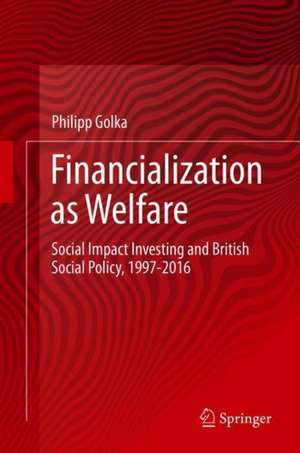Financialization as Welfare: Social Impact Investing and British Social Policy, 1997-2016
Autor Philipp Golkaen Limba Engleză Hardback – 21 ian 2019
Opening up a new perspective on financialization processes in the terrain of public policy, this book invites readers to refocus scholarship on capitalist dynamics to the meso-level. Based on this analysis, the author also proposes ways to transform social impact investing to increase its potential for reducing global inequalities.
Preț: 395.09 lei
Nou
Puncte Express: 593
Preț estimativ în valută:
75.61€ • 78.49$ • 63.05£
75.61€ • 78.49$ • 63.05£
Carte tipărită la comandă
Livrare economică 24 martie-07 aprilie
Preluare comenzi: 021 569.72.76
Specificații
ISBN-13: 9783030060992
ISBN-10: 3030060993
Pagini: 255
Ilustrații: XIX, 265 p. 6 illus.
Dimensiuni: 155 x 235 mm
Greutate: 0.58 kg
Ediția:1st ed. 2019
Editura: Springer International Publishing
Colecția Springer
Locul publicării:Cham, Switzerland
ISBN-10: 3030060993
Pagini: 255
Ilustrații: XIX, 265 p. 6 illus.
Dimensiuni: 155 x 235 mm
Greutate: 0.58 kg
Ediția:1st ed. 2019
Editura: Springer International Publishing
Colecția Springer
Locul publicării:Cham, Switzerland
Cuprins
Introduction.- Financialization and Social Impact Investing.- Financialization, Fields, and Change.- Methodology and Research Methods.- The Financialization of Welfare.- Financialization as Welfare.- Field Emergence and Stabilization.- Financialization, Resonance, and the Emergence of Cross-Field Ties.- Discussion and Conclusion.- Appendices.- References
Notă biografică
Philipp Golka obtained his PhD in Sociology from the Friedrich Schiller University Jena, Germany and has researched financialization at the University of Hamburg, Germany, and the École des Hautes Études en Sciences Sociales Paris, France. He first became interested in impact investing in 2011 and, before becoming a researcher, has held multiple professional positions related to the field.
Textul de pe ultima copertă
Providing an in-depth case study on the emergence of social impact investing in the UK, this book develops a new perspective on financialization processes that highlights the roles of non-financial actors. In contrast to the common view that impact investing gears finance toward the solution of social problems, the author analyzes how these investments create new problems and inequalities. To explain how social impact investing became popular in British social policy despite its unclear effectiveness, the author focuses on cooperative relations between institutional entrepreneurs from finance and various non-financial actors. Drawing on field theory, he shows how seemingly unrelated social transformations – such as HM Treasury's expanding role in public service reform – may act as resonance spaces for the spread of finance.
Opening up a new perspective on financialization processes in the terrain of public policy, this book invites readers to refocus scholarship on capitalist dynamics to the meso-level. Based on this analysis, the author also proposes ways to transform social impact investing to increase its potential for reducing global inequalities.
Opening up a new perspective on financialization processes in the terrain of public policy, this book invites readers to refocus scholarship on capitalist dynamics to the meso-level. Based on this analysis, the author also proposes ways to transform social impact investing to increase its potential for reducing global inequalities.
Caracteristici
Presents an in-depth case study on the emergence of social impact investing in the UK Empirically analyzes the political origins of social innovations in financial markets Recommends approaches for practitioners interested in social impact investing
